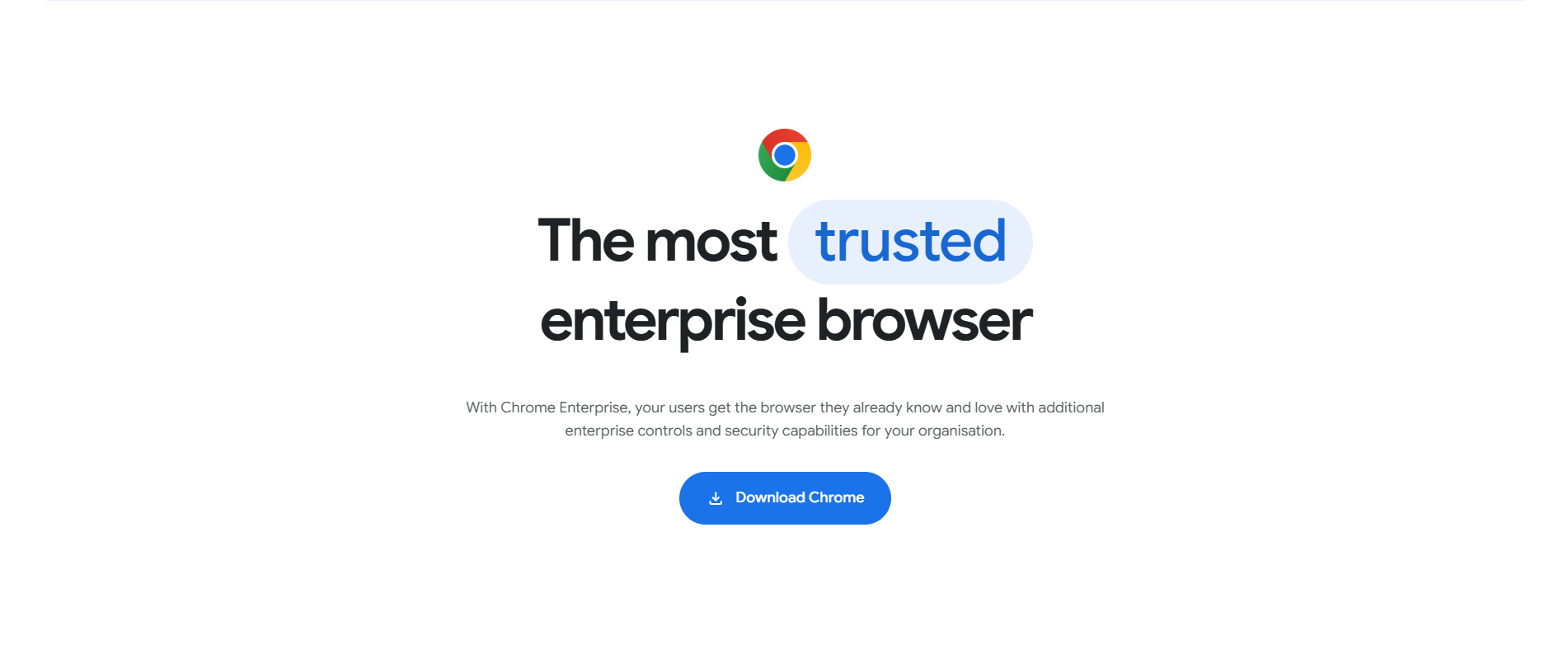TechRadar Verdict
Google Chrome is the most popular browser in the world. Unlike its desktop version, the enterprise incarnation combines the best features of Chrome with the advantages of a centrally managed product that businesses can get started with for no cost.
Pros
- +
Familiar user experience
- +
No-cost access
- +
Intuitive management interface
Cons
- -
Advanced features come at a cost
Why you can trust TechRadar
Chrome Enterprise is Google’s enterprise-centric version of its popular Chrome browser. With Chrome Enterprise, businesses get the ability to remotely manage the browser and its various aspects, for all their employees across the company.
They can, for instance, manage and control the use of web apps, and extensions, and can influence all kinds of browser settings. Chrome Enterprise also offers several security controls, protects against malware and phishing attempts, and even offers data loss prevention functionality.
This is especially useful these days as web browsers have emerged as a doorway to cyberattacks. In fact, several security reports have shown that a majority of security breaches hit companies through their browsers.
This doesn’t come as a surprise since the growth of cloud-based applications, and powerful SaaS platforms, combined with the accelerated adoption of remote working, has helped transform the web browser into an all-in-one workstation.
Here’s everything you want to know about Chrome Enterprise and whether it’s the best web browser for your business.
Chrome Enterprise: Features
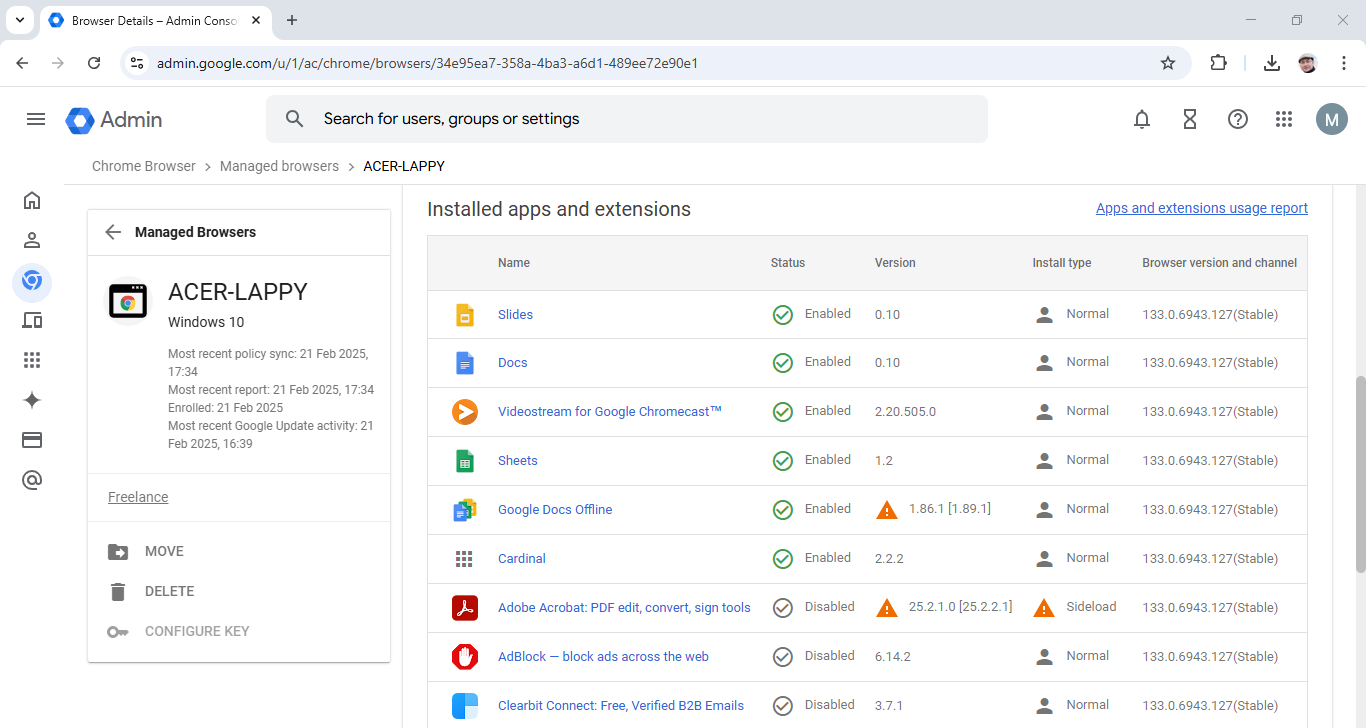
Chrome Enterprise is built around the Chrome web browser and inherits all its security features, and productivity enhancements.
For instance, Chrome Enterprise too runs every web page and web app in an isolated environment of its own to protect other tabs against malicious code. You also get Google’s Gemini AI to help create content and summarize information, as well as improve your search with Google Lens.
Sign up to the TechRadar Pro newsletter to get all the top news, opinion, features and guidance your business needs to succeed!
Besides the regular browser features, Chrome Enterprise also gets you a cloud-based management and reporting interface for free in the form of Chrome Enterprise Core.
After signing up for Chrome Enterprise Core, IT admins can control how your employees use their browsers, from a single console, irrespective of whether they use Windows machines, Linux distros, MacBooks, and Macs, or even iOS and Android devices.
The IT department can segregate browsers into multiple groups for fine-tuned control. This allows them to define and implement different policies for different departments, different job profiles, and even different offices. They can, for instance, mandate certain extensions for the sales team, while disabling them for remote developers.
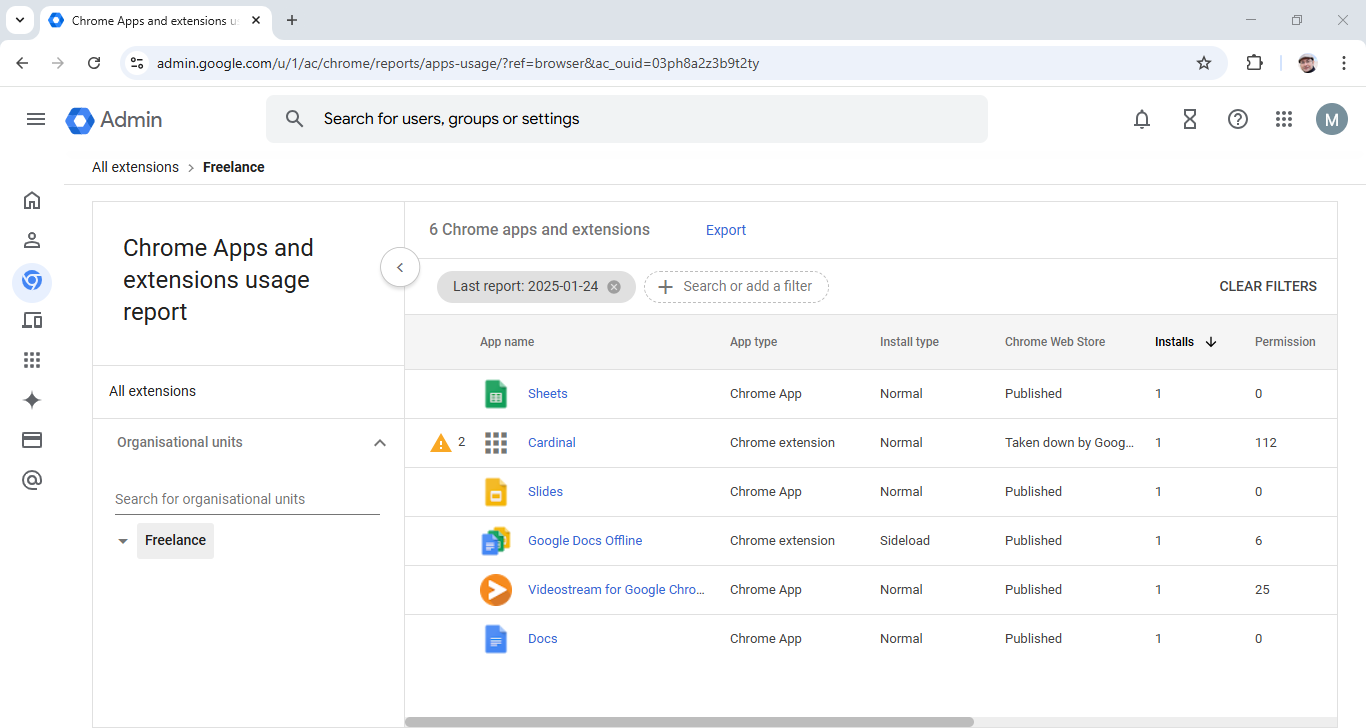
Talking of extensions, you can use Chrome Enterprise Core to allow, block, force-install or pin Chrome extensions, and even enable your employees to request extensions. IT admins can also remotely send commands to the browser, for example, to delete browser caches or cookies, and tweak all kinds of settings.
In addition to controlling the browsers, Chrome Enterprise also offers detailed reports on the browser’s deployment and use across your organization. You get the ability to view all versions of Chrome installed in your company, along with all the installed web apps and extensions. It’ll also help you keep track of things such as browser crashes, password reuse and more.
For more advanced security and data protections, you can subscribe to Chrome Enterprise Premium, which costs $6/user/month. This will get you additional controls to enforce policies, detailed security reporting functions, and more.
Chrome Enterprise: Privacy
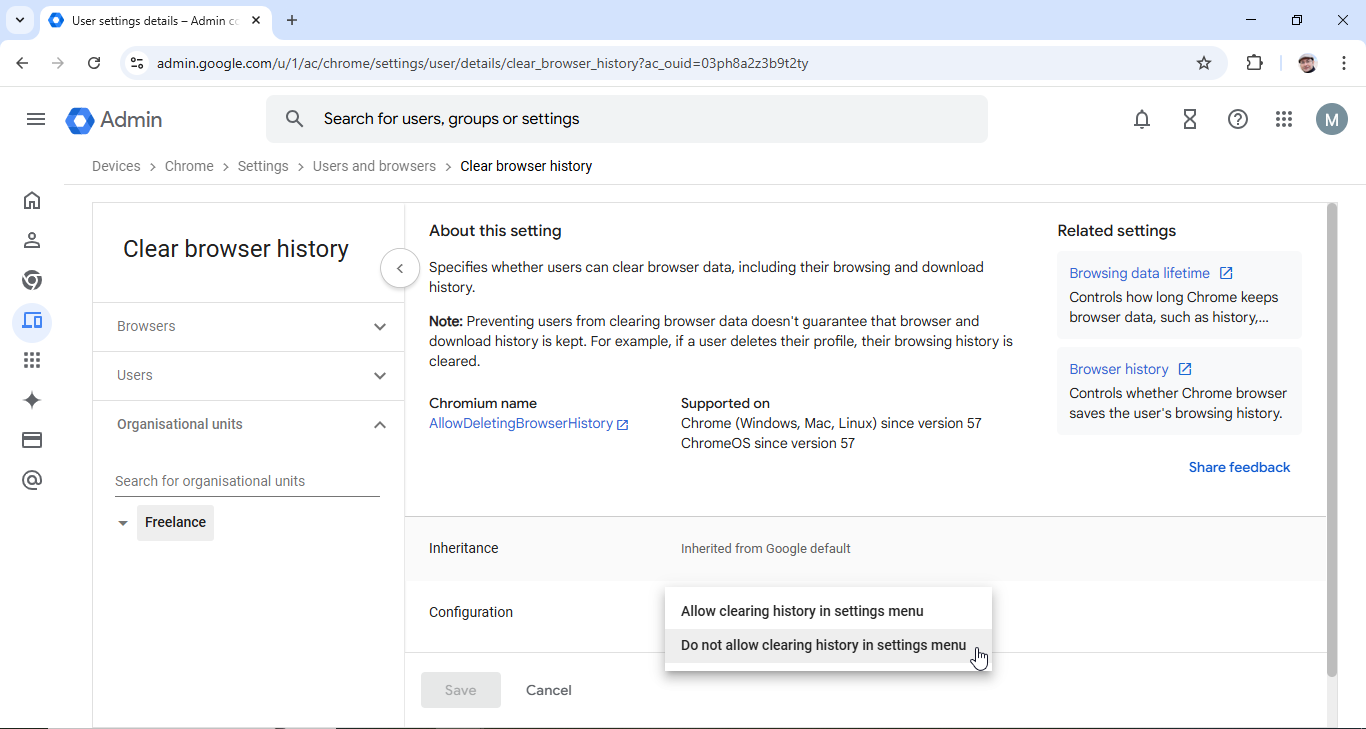
The biggest advantage with Chrome Enterprise is that it enables centralized browser management. This helps reduce privacy risks by enabling knowledgeable IT admins make informed decisions on behalf of the employees, not all of whom will be well-versed with the dangers lurking on the web.
Chrome Enterprise benefits from Chrome’s malware and phishing protections, and will also prevent users from visiting harmful sites. It’ll also help the IT department keep an eye on the use of extensions and their behavior, for instance, if they are accessing cookies.
Chrome Enterprise also helps cure some of Chrome’s nefarious privacy-invading features. For instance, it’ll help you control your users’ ad privacy settings, and override whether the browser sends usage statistics and crash-related data to Google.
This is especially useful as depending on how it’s configured, the usage stats include details such as memory usage, button clicks, as well as web page URLs and other personal information. Similarly, crash reports contain system information at the time of the crash, and even URLs, and personal information depending on what the user was doing when the crash reporting was activated.
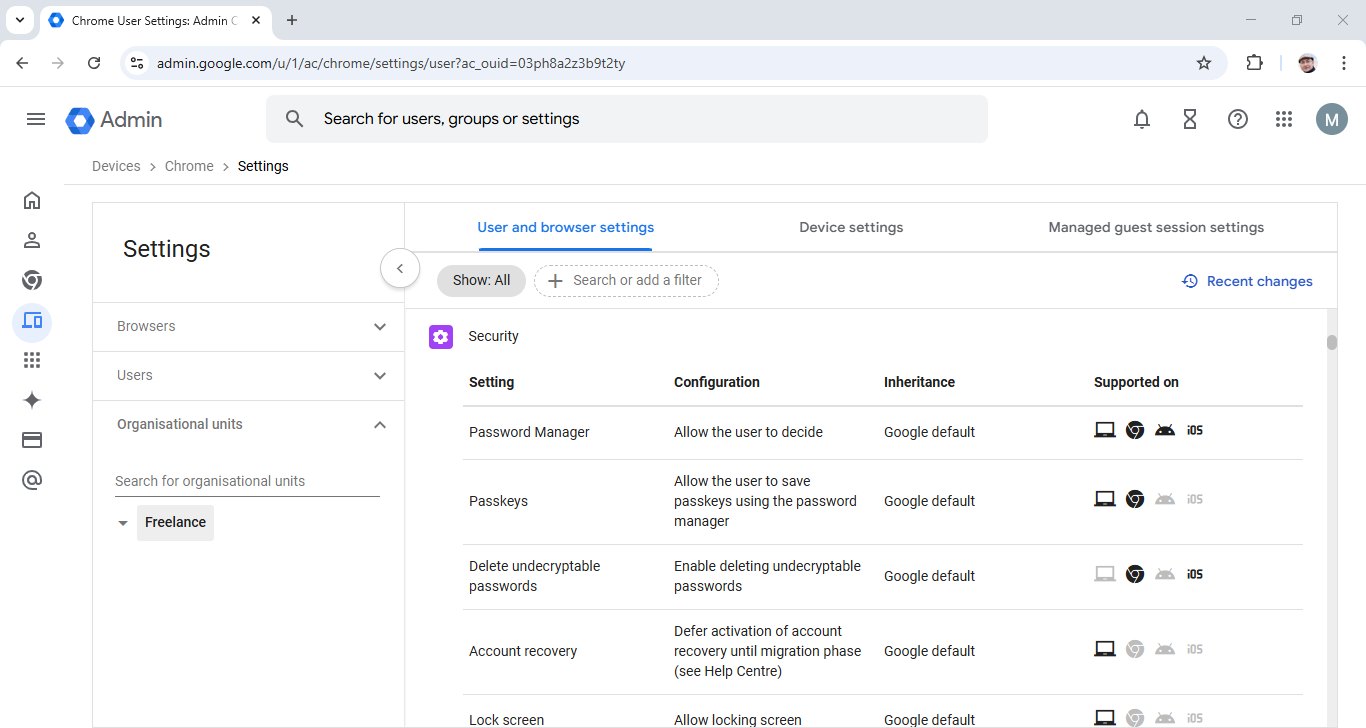
Chrome Enterprise: Ease of use
The management console of Chrome Enterprise Core is fairly intuitive and easy to navigate, which, Google claims, makes it accessible to IT admins of varying technical skill levels. It helps IT define and enforce policies and browser configurations across different operating systems and devices using a point-and-click interface that’s easy on the eyes.
It also helps ease the process of managing a large number of devices, as all browser settings and policies are controlled from a single console.
The cloud-based management console has interactive setup guides that’ll take admins through the entire setup and configuration process. The process to enroll browsers is straightforward and well-documented with detailed OS-specific instructions.
Chrome Enterprise: Competitors
Chrome Enterprise is built around the regular Google Chrome browser, and has all the features you’d expect from a modern desktop and mobile web browser. As an everyday browser, it’s right up there with the best such as Microsoft Edge, Mozilla Firefox, Safari, and their ilk.
The primary competition for Chrome Enterprise Core comes from other enterprise-focused browser management solutions. Different enterprise browsers have different capabilities and go about securing the browser differently.
One of the first enterprise browsers in the market was Island. While Chrome Enterprise takes pride in its management capabilities, especially for large-scale deployments, Island offers fairly detailed reports about how the users are using the web, as well as granular security controls.
Other popular enterprise browsers include the Citrix Enterprise Browser whose USP is its seamless integration with the Citrix Workspace platform. There’s also Microsoft Edge for Business that similarly offers tight integration with Microsoft 365 applications like Outlook, Teams, and OneDrive.
In addition to standalone browsers, you also get products that operate much like browser extensions. They are designed to make regular internet browsers act like enterprise browsers. Solutions like LayerX Enterprise Browser Extension, and Red Access add extra security layers to your existing browser, saving your employees the effort to switch to a completely new browser.
Chrome Enterprise: Final verdict
Chrome Enterprise offers the familiarity of the Chrome web browser along with the centrally managed advantages of an enterprise browser.
You can sign up for Chrome Enterprise Core for $0, which makes it affordable to even the smallest of organizations. Chrome Enterprise is a good option for businesses with mixed device environments, and even more so for those that need to strengthen their BYOD policies.
The product’s central management console is fairly intuitive and well-documented for IT admins, and presents a familiar user experience to end users. Combined with its no-cost tier Chrome Enterprise presents itself as a must-try option for any business looking for an enterprise browser.
Try secure private browsing with the best VPN service.
With almost two decades of writing and reporting on Linux, Mayank Sharma would like everyone to think he’s TechRadar Pro’s expert on the topic. Of course, he’s just as interested in other computing topics, particularly cybersecurity, cloud, containers, and coding.
You must confirm your public display name before commenting
Please logout and then login again, you will then be prompted to enter your display name.
